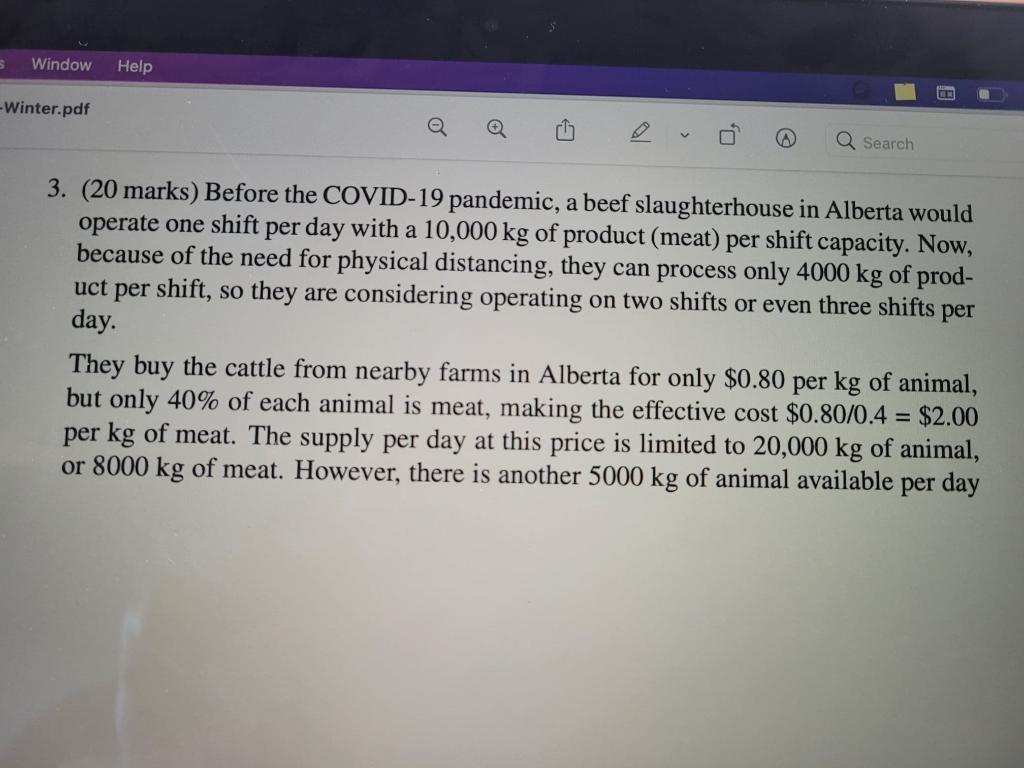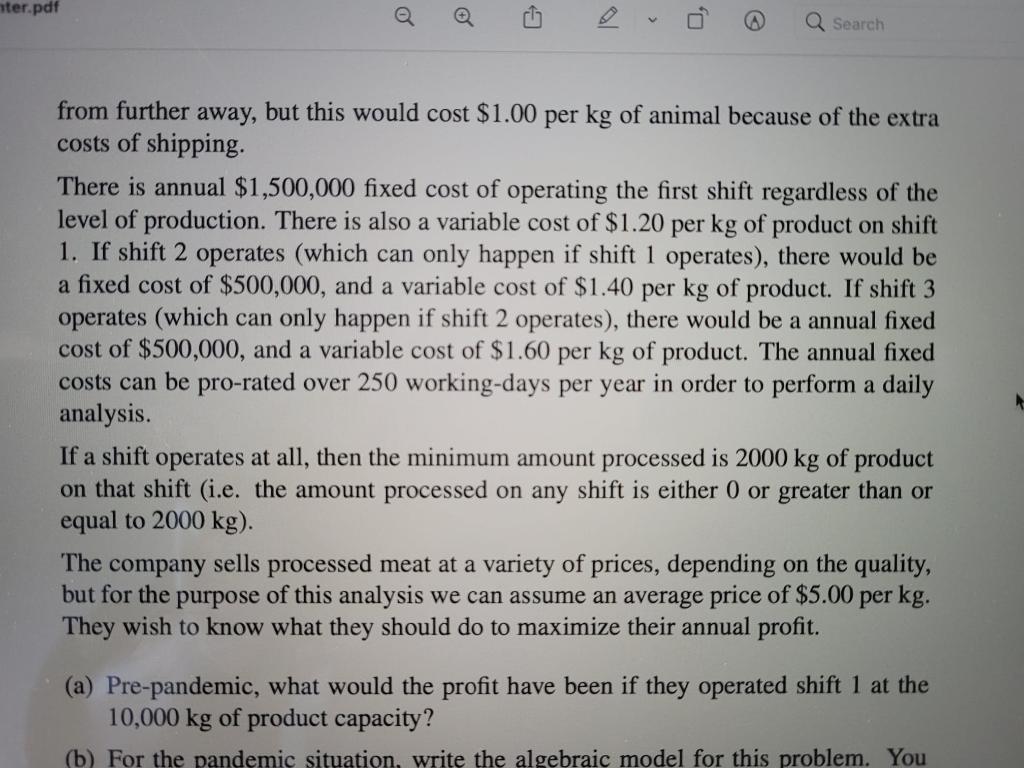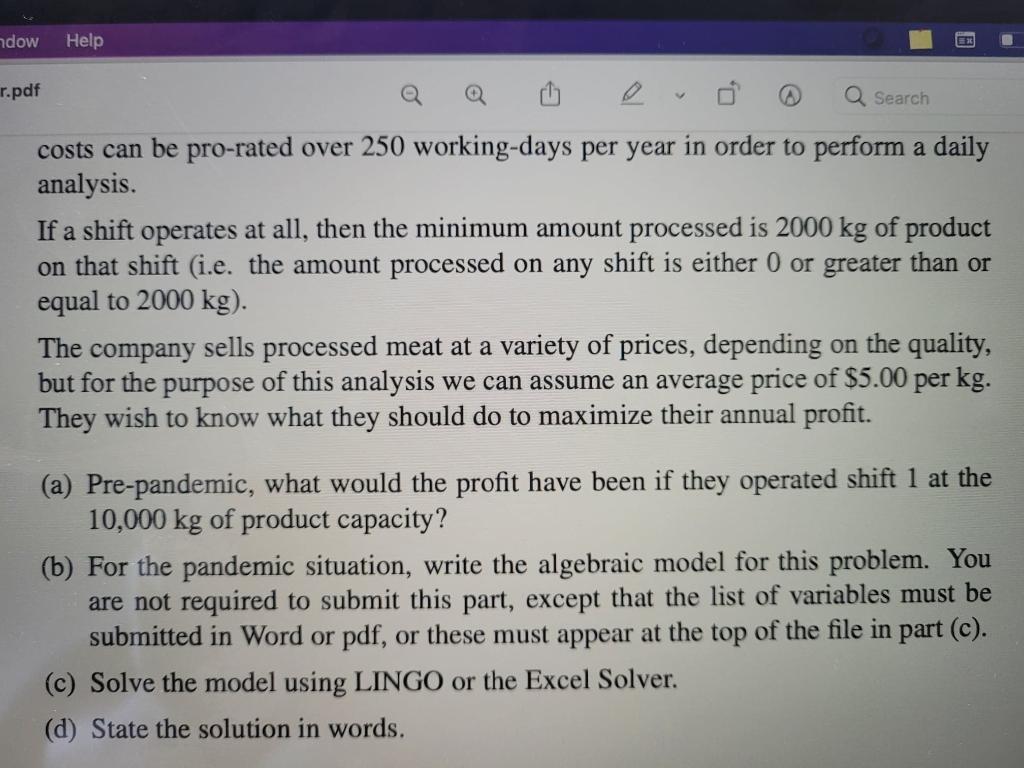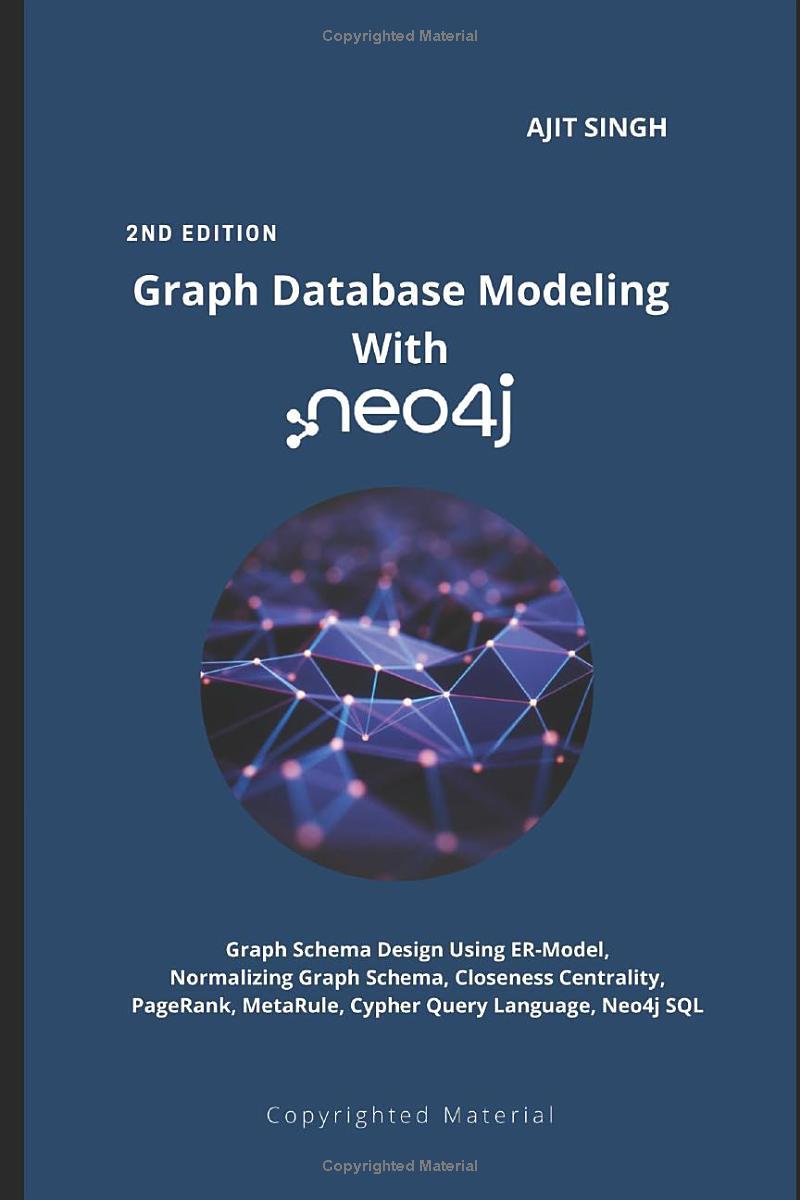Answered step by step
Verified Expert Solution
Question
1 Approved Answer
Please Solve Using Lingo Only Please Solve Using Lingo Only. 5 Window Help Winter.pdf Q Search 3. (20 marks) Before the COVID-19 pandemic, a beef
Please Solve Using Lingo Only



Please Solve Using Lingo Only.
5 Window Help Winter.pdf Q Search 3. (20 marks) Before the COVID-19 pandemic, a beef slaughterhouse in Alberta would operate one shift per day with a 10,000 kg of product (meat) per shift capacity. Now, because of the need for physical distancing, they can process only 4000 kg of prod- uct per shift, so they are considering operating on two shifts or even three shifts per day. They buy the cattle from nearby farms in Alberta for only $0.80 per kg of animal, but only 40% of each animal is meat, making the effective cost $0.80/0.4 = $2.00 per kg of meat. The supply per day at this price is limited to 20,000 kg of animal, or 8000 kg of meat. However, there is another 5000 kg of animal available per day ater.pdf Q Search from further away, but this would cost $1.00 per kg of animal because of the extra costs of shipping. There is annual $1,500,000 fixed cost of operating the first shift regardless of the level of production. There is also a variable cost of $1.20 per kg of product on shift 1. If shift 2 operates (which can only happen if shift 1 operates), there would be a fixed cost of $500,000, and a variable cost of $1.40 per kg of product. If shift 3 operates (which can only happen if shift 2 operates), there would be a annual fixed cost of $500,000, and a variable cost of $1.60 per kg of product. The annual fixed costs can be pro-rated over 250 working-days per year in order to perform a daily analysis. If a shift operates at all, then the minimum amount processed is 2000 kg of product on that shift (i.e. the amount processed on any shift is either 0 or greater than or equal to 2000 kg). The company sells processed meat at a variety of prices, depending on the quality, but for the purpose of this analysis we can assume an average price of $5.00 per kg. They wish to know what they should do to maximize their annual profit. (a) Pre-pandemic, what would the profit have been if they operated shift 1 at the 10,000 kg of product capacity? (b) For the pandemic situation, write the algebraic model for this problem. You ndow Help 20 r.pdf Search costs can be pro-rated over 250 working-days per year in order to perform a daily analysis. If a shift operates at all, then the minimum amount processed is 2000 kg of product on that shift (i.e. the amount processed on any shift is either 0 or greater than or equal to 2000 kg). The company sells processed meat at a variety of prices, depending on the quality, but for the purpose of this analysis we can assume an average price of $5.00 per kg. They wish to know what they should do to maximize their annual profit. (a) Pre-pandemic, what would the profit have been if they operated shift 1 at the 10,000 kg of product capacity? (b) For the pandemic situation, write the algebraic model for this problem. You are not required to submit this part, except that the list of variables must be submitted in Word or pdf, or these must appear at the top of the file in part (c). (c) Solve the model using LINGO or the Excel Solver. (d) State the solution in words. 5 Window Help Winter.pdf Q Search 3. (20 marks) Before the COVID-19 pandemic, a beef slaughterhouse in Alberta would operate one shift per day with a 10,000 kg of product (meat) per shift capacity. Now, because of the need for physical distancing, they can process only 4000 kg of prod- uct per shift, so they are considering operating on two shifts or even three shifts per day. They buy the cattle from nearby farms in Alberta for only $0.80 per kg of animal, but only 40% of each animal is meat, making the effective cost $0.80/0.4 = $2.00 per kg of meat. The supply per day at this price is limited to 20,000 kg of animal, or 8000 kg of meat. However, there is another 5000 kg of animal available per day ater.pdf Q Search from further away, but this would cost $1.00 per kg of animal because of the extra costs of shipping. There is annual $1,500,000 fixed cost of operating the first shift regardless of the level of production. There is also a variable cost of $1.20 per kg of product on shift 1. If shift 2 operates (which can only happen if shift 1 operates), there would be a fixed cost of $500,000, and a variable cost of $1.40 per kg of product. If shift 3 operates (which can only happen if shift 2 operates), there would be a annual fixed cost of $500,000, and a variable cost of $1.60 per kg of product. The annual fixed costs can be pro-rated over 250 working-days per year in order to perform a daily analysis. If a shift operates at all, then the minimum amount processed is 2000 kg of product on that shift (i.e. the amount processed on any shift is either 0 or greater than or equal to 2000 kg). The company sells processed meat at a variety of prices, depending on the quality, but for the purpose of this analysis we can assume an average price of $5.00 per kg. They wish to know what they should do to maximize their annual profit. (a) Pre-pandemic, what would the profit have been if they operated shift 1 at the 10,000 kg of product capacity? (b) For the pandemic situation, write the algebraic model for this problem. You ndow Help 20 r.pdf Search costs can be pro-rated over 250 working-days per year in order to perform a daily analysis. If a shift operates at all, then the minimum amount processed is 2000 kg of product on that shift (i.e. the amount processed on any shift is either 0 or greater than or equal to 2000 kg). The company sells processed meat at a variety of prices, depending on the quality, but for the purpose of this analysis we can assume an average price of $5.00 per kg. They wish to know what they should do to maximize their annual profit. (a) Pre-pandemic, what would the profit have been if they operated shift 1 at the 10,000 kg of product capacity? (b) For the pandemic situation, write the algebraic model for this problem. You are not required to submit this part, except that the list of variables must be submitted in Word or pdf, or these must appear at the top of the file in part (c). (c) Solve the model using LINGO or the Excel Solver. (d) State the solution in wordsStep by Step Solution
There are 3 Steps involved in it
Step: 1

Get Instant Access to Expert-Tailored Solutions
See step-by-step solutions with expert insights and AI powered tools for academic success
Step: 2

Step: 3

Ace Your Homework with AI
Get the answers you need in no time with our AI-driven, step-by-step assistance
Get Started


